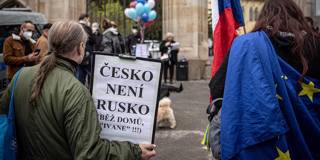The geopolitical situation in Central Europe has long seemed clear. But, following the revelation that Russian agents were behind a 2014 attack on a munitions depot in the Czech Republic, many Czechs now understand that they have no choice but to engage with geopolitics and the values that underpin the country's alliances.
PRAGUE – The Czech Republic has endured one of its most dramatic fortnights since the Velvet Revolution in 1989, following the government’s announcement that two Russian agents were responsible for explosions at a munitions depot in the Moravian village of Vrbětice in 2014, in which two people were killed. Former Prime Minister Bohuslav Sobotka expressed the public’s shock perfectly: “I would say that this is the largest Russian attack on Czech soil since the invasion in 1968. It is a historic moment, and we must react.”
And we have reacted. The Czech government expelled 18 Russian spies working at Russia’s embassy in Prague, provoking a predictable tit-for-tat expulsion of Czech diplomats in Moscow. More important, it may be a turning point for the Czech Republic, if not for Central Europe.
The geopolitical situation in the region has long seemed clear. Poland is firmly opposed to the Kremlin, the Slovaks try to remain invisible, the Hungarians under Prime Minister Viktor Orbán are the Kremlin’s placemen in Europe, and the Czechs zigzag, trying not to alienate either Russia or NATO. As early as the end of the nineteenth century, the poet Josef Svatopluk Machar captured the Czech stance: “And we balance our sympathies / from the East in the West, from the West in the East / with the faults of both, but none of their strengths…”

PRAGUE – The Czech Republic has endured one of its most dramatic fortnights since the Velvet Revolution in 1989, following the government’s announcement that two Russian agents were responsible for explosions at a munitions depot in the Moravian village of Vrbětice in 2014, in which two people were killed. Former Prime Minister Bohuslav Sobotka expressed the public’s shock perfectly: “I would say that this is the largest Russian attack on Czech soil since the invasion in 1968. It is a historic moment, and we must react.”
And we have reacted. The Czech government expelled 18 Russian spies working at Russia’s embassy in Prague, provoking a predictable tit-for-tat expulsion of Czech diplomats in Moscow. More important, it may be a turning point for the Czech Republic, if not for Central Europe.
The geopolitical situation in the region has long seemed clear. Poland is firmly opposed to the Kremlin, the Slovaks try to remain invisible, the Hungarians under Prime Minister Viktor Orbán are the Kremlin’s placemen in Europe, and the Czechs zigzag, trying not to alienate either Russia or NATO. As early as the end of the nineteenth century, the poet Josef Svatopluk Machar captured the Czech stance: “And we balance our sympathies / from the East in the West, from the West in the East / with the faults of both, but none of their strengths…”